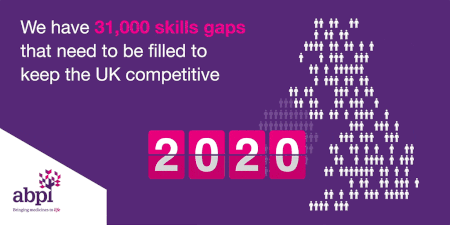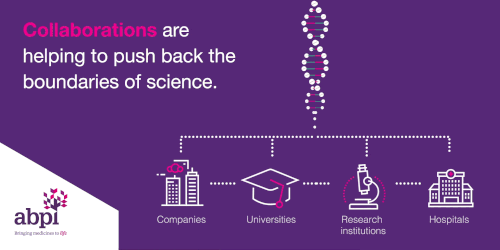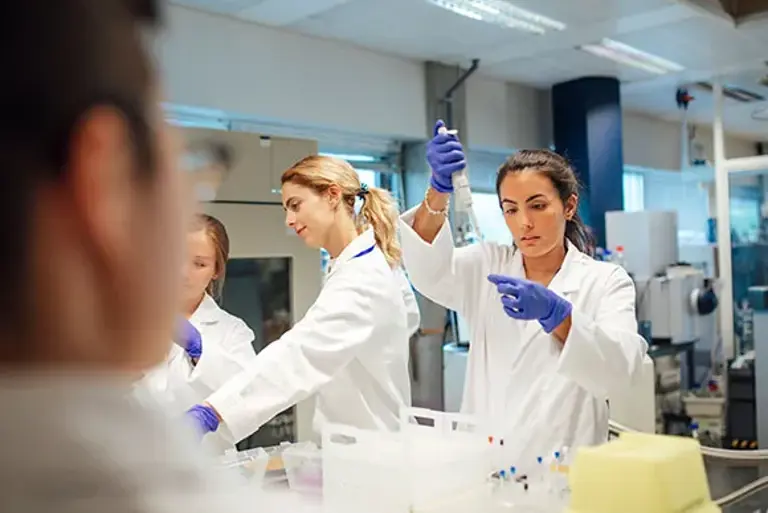Academic collaboration
A quarter of a million people are employed in the UK’s life science sector today. We need a continuous supply of specialists to stay competitive, meet the demands of an evolving, technology-based world and pioneer the next wave of medicines and vaccines.
ABPI President Haseeb Ahmad
Normal life in many ways has come to a halt, as a result of this Coronavirus pandemic.
Within life sciences, there's greater unity, great teamwork and collaboration to tackle this challenge to humanity.
There are significant global efforts underway to diagnose, treat and prevent infections from COVID-19.
Pharmaceutical companies are working tirelessly globally to combat the virus, and turning deep scientific knowledge gained from decades of experience and research with similar viruses to combat this virus.
Some are researching new vaccines and looking deep into the research libraries to identify additional potential treatments for research and development.
Some have donated compounds with the potential to treat Coronavirus for emergency use and clinical trials, and others are exploring new ways to use existing technologies that provide the ability to ramp up production once a vaccine is found.
Together with the broader, life sciences sector we are collaborating to accelerate development, manufacture and delivery of vaccines diagnostics and treatments for COVID-19.
We won't rest. We'll never forget, there is nothing more precious than life itself.
Who do we need to make the medicines of the future?
Establishing a skills pipeline remains crucial for the pharmaceutical industry and we have been proactive about STEM skills and employability, helping students from a diverse range of backgrounds to make informed choices about fulfilling careers in a highly productive sector of the economy.
We have also been clear about the need for the UK to develop a future immigration system that is needs-based, straightforward and rapid, and which facilitates the ease of movement for highly skilled talent in life sciences.
Establishing a skills pipeline
For us, it’s not just about staying globally competitive today but about being ready for the future. The UK must be ready to plug evolving skills gaps to maintain its world-leading position for medicines and vaccines research and development.
In 2019 we identified major skills gaps in areas including genomics, immunology, bioinformatics, chemoinformatics, and clinical pharmacology – emerging areas of technology that mark the frontier of medical innovation.
There are more than 31,000 more jobs that need to be filled by 2025 in highly skilled scientific roles vital to the UK’s successful pharmaceutical and biotech sectors. This needs to be addressed for our industry to thrive and continue to be a key strength to the UK economy.


Collaborations are helping to push back the boundaries of science
As part of our commitment to assisting the development of a skills pipeline, the ABPI has taken a cross-sector approach forming the ‘Clinical Pharmacology Skills Alliance’ to represent the interests of the pharmaceutical industry, and the clinical pharmacologists who are working across industry, academia and the NHS.
In the Life Science Industrial Strategy Sector Deal 2, the pharmaceutical industry made a commitment to work with Government to:
- Commission a life sciences 2030 Skills Strategy to build on the current evidence base of the status of life science skills and future scenarios.
- Develop solutions to encourage more young people to pursue STEM subjects and careers by supporting the British Science Association’s work to deliver a new government-funded competition for young people, inspiring them about STEM through learning how society, technologies and jobs will change as a result of addressing the Industrial Strategy Grand Challenges.
- Convene key partners in healthcare and industry to identify opportunities to improve support focused on research and innovation for medics throughout their training and career.
We are working with partners throughout the wider life sciences ecosystem to make sure the UK is ready to make the most of emerging technologies and realise our ambition to make it the best place in the world to research, develop and use new medicines and vaccines.
Establishing a new immigration system
Science research is a global endeavour, and the ability to bring in a diversity of talent from different parts of the world helps with innovation, learning from other countries and advancing our practices. This cross-fertilisation of knowledge is also critical within academia and research.
As the UK Government works to develop its future immigration system, it is important to remember that our members predominantly sponsor highly skilled individuals to facilitate:
- permanent moves of employees and external new hires
- filling short-term skills gaps on a temporary basis
- working on key projects based in the UK as a temporary assignment with a specified end date
- developing global talent
Our members look to fill vaccines from within the UK in the first instance and we are committed to working with Government to maximise the number of resident workers filling roles across the industry.
We believe a future immigration system must be needs-based, straightforward and rapid, and one which facilitates the ease of movement for highly skilled talent in life sciences.

Want to find out what it’s like to work in the industry? Looking for opportunities to get into the industry, or the options available to you? Trying to advise someone interested in entering the industry? This section is here to help.

The ABPI Examination is mandatory for all medical representatives working for companies who have agreed to abide by the ABPI Code of Practice for the Pharmaceutical Industry.

The UK is recognised worldwide as a leader in medical research and innovation, and the foundations for collaborations between industry and academia in the UK are exceptionally strong.
Last modified: 16 May 2024
Last reviewed: 16 May 2024
